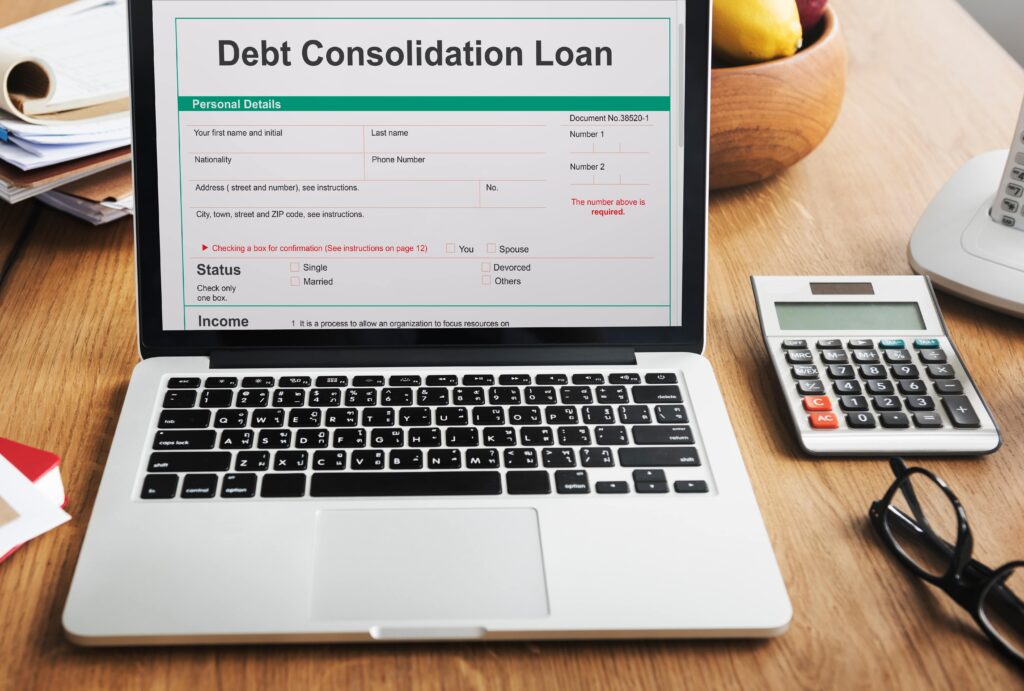Debt consolidation loans have become the most popular type of loan in 2024, because consumer debt is at an all-time high in the U.S. We all know that sinking feeling of being overwhelmed by mounting debts. It can feel like you’re drowning in a sea of financial obligations with no end.
But fear not; we have a life raft for you – debt consolidation loans. This comprehensive guide will explore how these loans can help you regain control of your finances and set you on the path to financial freedom.
What is a Debt Consolidation Loan?
The Basics
A debt consolidation loan is a financial tool that allows you to combine multiple debts into a single loan with a lower interest rate and a more manageable payment schedule. By consolidating your debts, you can simplify your monthly budget, save money on interest, and pay off your debts faster.
The Benefits
Consolidating your debts into one payment can bring you a multitude of benefits, including:
- Simplicity: You only need to make one payment instead of multiple payments to different creditors, making it easier to keep track of your finances.
- Lower interest rates: A consolidated loan typically offers lower rates than your existing debts, which means you can save a significant amount of money in interest charges over time.
- Improved credit score: On-time payments and a lower debt-to-income ratio can boost your credit score, which is crucial for future loan approvals and lower interest rates.
- Financial control: With one clear repayment plan, you can stay on track and avoid future debt pitfalls. This means you can plan your budget more effectively and easily manage your finances.
Can a Debt Consolidation Loan Make Your Credit Score Worse?
When done correctly, debt consolidation loan will help your credit score. By making your monthly payment on time every month your credit score will be impacted positively. When people say debt consolidation hurts your credit report, they are not actually referring to the loan. When anyone has a hard inquiry, which appears on your credit reports each time you seek credit. Experian suggests that the reduction is generally less than 5 points, and your score is expected to recover within a few months.
Consolidating your debts into one payment can simplify your financial life, save money, improve your credit score, and provide greater financial control. It’s a smart move for anyone looking to take control of their finances and achieve financial stability.
Many people confuse debt settlement with debt consolidation loans and they are very different. With a debt consolidation loan, all of your credit card debt is paid off through the loan. With debt settlement, the consumer stops making the monthly payments and then the debt settlement company negotiates a lower payment. Debt settlement can damage your credit score.
Am I allowed to use my credit cards after consolidating the debt in a debt consolidation loan?
Certainly, but the outcome hinges on your specific circumstances. If your account is still active and in good standing, you should retain the ability to use your credit card post-consolidation. However, it remains crucial to uphold responsible spending practices and ensure timely payments. In some cases, the debt consolidation company will require you to close your credit card accounts when consolidating debt, but it also depending on whether you are doing a secure or unsecure debt consolidation loan. Read more from the Consumer Financial Bureau about consolidating debt.
Types of Debt Consolidation Loans
Secured Loans
Secured loans are backed by collateral, such as your home or car. If you default on the loan, the lender can seize the collateral to recoup their losses. The advantage of secured loans is that they typically offer lower interest rates.
Unsecured Loans
Unsecured loans, on the other hand, do not require collateral. This can be advantageous if you don’t have any assets to offer as security. However, unsecured loans often come with higher interest rates due to the increased risk for the lender.
Second Mortgage
A second mortgage is another option for consolidating debt. You can use the equity to pay off your other debts by taking out a second mortgage on your home. This can result in a lower interest rate and tax benefits. However, it’s essential to remember that your home is used as collateral, so if you default on the loan, you risk losing your property. Learn more about a second mortgage from BD Nationwide.
How to Qualify for a Debt Consolidation Loan

Credit Score
A good credit score is key to qualifying for a debt consolidation loan. Lenders will be more likely to approve your application if you have a history of making on-time payments and managing your debts responsibly.
Debt-to-Income Ratio
Lenders also consider your debt-to-income ratio (DTI), the percentage of your monthly gross income that goes toward debt payments. A lower DTI indicates a lower risk for the lender and increases your chances of approval.
Monthly Income & Job Stability
Steady monthly income and job stability are essential when applying for a debt consolidation loan. Lenders want to ensure that you have a reliable source of income to make the monthly payments on your new loan. A stable employment history demonstrates that you are a low-risk borrower, increasing your chances of being approved for a debt consolidation loan.
Total Loan to Value (LTV)
Total loan to value (LTV) is another critical factor when qualifying for a debt consolidation loan, especially considering a secured loan or a second mortgage. LTV is the ratio of the total amount you owe on your loans to the value of the collateral (typically your home).
How to Choose the Right Debt Consolidation Loan
When it comes to choosing the right debt consolidation loan, there are several factors that you need to take into consideration, including:
Interest Rates
When choosing a debt consolidation loan, comparing interest rates from multiple lenders is important. The interest rate is the percentage you will be charged on the amount you borrow.
A lower interest rate means that you will pay less interest over the life of the loan. By comparing interest rates, you can find the best deal and save significant money in the long run.
Loan Terms
The loan term is the time you have to repay the loan. When considering the loan term, consider your financial situation and choose a term that fits your needs and budget. A shorter loan term means higher monthly payments, but you will pay less overall interest.
Conversely, a longer loan term means lower monthly payments but more interest paid over time. It’s important to find a balance between the loan term and monthly payments that works for you.
Fees and Charges
In addition to the interest rate and loan term, it’s important to consider any fees and charges associated with the loan. Some lenders may charge origination fees, which are fees charged for processing the loan. Others may charge prepayment penalties if you pay off the loan early.
These fees can add up and significantly increase the overall cost of the loan. It’s essential to review the loan terms and conditions carefully and ask your lender about any fees or charges before signing any agreement.
Tips for Managing Your Debt Consolidation Loan

Managing your debt consolidation loan can be challenging, but staying focused and taking control of your finances is essential. To help you stay on track, we have compiled a list of tips for managing your debt consolidation loan. Here are some tips:
Create a realistic budget
Creating a budget is an essential step in managing your debt consolidation loan. It is crucial to ensure you can afford the new loan payment and still cover your other expenses. When creating a budget, include all your monthly bills, such as rent/mortgage, utilities, groceries, and any other necessary expenses. This will help you stay on track and avoid falling back into debt.
Stick to your budget
Creating a budget is one thing, but sticking to it is another. It is easy to overspend or deviate from your budget, but it is crucial to stay disciplined. One way to stick to your budget is by tracking your expenses and keeping a record of every purchase you make. This will help you identify areas where you can cut back and stay within your budget.
Prioritize your debts
If you have extra money, consider making additional payments toward your high-interest debts first. This can help you pay off your debts faster and save on interest. By paying off your high-interest debts first, you will reduce the interest you pay over time and have more money to put toward your other debts.
Avoid taking on new debt
Taking on new debt while trying to pay off your existing debts can make it difficult to achieve your financial goals. Avoid using credit cards or taking out loans unless it is necessary. Instead, focus on paying off your existing debts and building an emergency fund to avoid relying on credit in the future.
Communicate with your lender
If you need help making your loan payments, it is essential to communicate with your lender. Your lender can work with you to adjust your payment schedule or offer other solutions to help you stay on track. Ignoring your lender and missing payments can lead to additional fees, damage your credit score, and make it more challenging to manage your debt.
Managing your debt consolidation loan requires discipline, focus, and commitment. By following these tips, you can take control of your finances and achieve your financial goals.
Alternatives to Debt Consolidation Loans
Balance Transfer Credit Cards
Balance transfer credit cards allow you to transfer your existing debts onto a new card with a lower interest rate, often 0% for a promotional period. This can help you save on interest and pay down your debt faster. However, be mindful of balance transfer fees and ensure you can pay off the balance before the promotional rate expires.
Debt Management Plans
Debt management plans involve working with a credit counseling agency to develop a plan for repaying your debts. The agency may negotiate lower interest rates or waive fees with your creditors. While this option can help you manage your debt, it may also require you to close your credit accounts, impacting your credit score.
Debt consolidation vs. debt settlement: Which is preferable?
The choice between debt consolidation and debt settlement depends on individual circumstances. Debt consolidation is beneficial for some consumers as it provides a streamlined approach to getting out of debt, particularly with high-interest debts like credit cards. However, it requires good credit for the best loan terms and the ability to stay current with payments.
If you have an overwhelming amount of debt or anticipate challenges in paying it off independently, debt settlement may be worth considering, especially if you’re willing to negotiate with creditors on your own. If you choose to work with a debt settlement company, additional factors come into play.
Deciding whether to consolidate or settle debt hinges on individual circumstances and financial goals. Debt consolidation can be a viable debt relief option if you have high-interest debts like credit cards and can secure a consolidation loan with a significantly lower interest rate. It’s important to note that debt consolidation is a restructuring option and won’t alter the total amount owed. This makes it a reasonable approach if your outstanding debt is manageable, and the monthly payments align comfortably with your budget.
How To Get a Debt Consolidation Loan Summary
Debt consolidation loans can be a powerful tool in your journey toward financial freedom. By understanding the different types of loans, the qualification process, and how to choose the right loan for your needs, you can regain control of your finances and work towards a debt-free future.
Are you thinking about getting a debt consolidation loan? Contact us today for more information!
Debt Consolidation Loan FAQs
Can I qualify for a debt consolidation loan with bad credit?
While qualifying for a debt consolidation loan with bad credit may be more challenging, some lenders specialize in loans for borrowers with less-than-perfect credit. However, these loans may come with higher interest rates.
Can I consolidate all types of debt with a debt consolidation loan?
Most commonly, debt consolidation loans are used for unsecured debts such as credit cards, personal loans, and medical bills. However, some lenders may also allow you to consolidate secured debts, like auto loans or mortgages, as well as second mortgages.
Will a debt consolidation loan hurt my credit score?
Initially, your credit score may dip due to the hard inquiry from the loan application. However, a debt consolidation loan can improve your credit score in the long run by helping you make on-time payments and reducing your overall debt.
Can I pay off my debt consolidation loan early without penalties?
Some lenders allow for early repayment without penalties, while others may charge prepayment fees. Be sure to read the loan terms and conditions before committing.
Is a debt consolidation loan my only option for managing debt?
There are several alternatives to debt consolidation loans, such as balance transfer credit cards and debt management plans. It’s essential to research and consider all your options before deciding on the best solution for your financial situation.
How hard is it to get a consolidation loan?
The difficulty of getting a consolidation loan can vary depending on factors such as your credit score, income, and the lending institution’s lending criteria.
If you have a good credit score and a stable income, you may find it easier to get a consolidation loan. However, if your credit score is low or you have a history of defaulting on loans, lenders may be less willing to offer you a consolidation loan.
Additionally, some lending institutions may have stricter lending criteria than others, which can affect your chances of being approved for a consolidation loan. It’s essential to shop around and compare different lenders’ requirements to find one that suits your financial situation.
Ultimately, the ease or difficulty of getting a consolidation loan depends on your circumstances and the lender you approach. Doing your research and speaking to a financial advisor to help you make informed decisions is always advisable.
What is the lowest credit score to get a consolidation loan?
There is no definitive answer to the lowest credit score to get a consolidation loan, as each lender sets its own requirements and criteria for approving loans. However, most lenders seek a credit score of at least 580 to support a consolidation loan.
If your credit score is lower than 580, you may still be able to get a consolidation loan, but you may need to explore alternative lenders that specialize in lending to borrowers with lower credit scores. Remember that these lenders may charge higher interest rates and fees to compensate for the increased risk of lending to borrowers with lower credit scores.
It’s always advisable to improve your credit score as much as possible before applying for a consolidation loan. You can do this by paying off outstanding debts, making all your payments on time, and disputing errors on your credit report. Improving your credit score increases your chances of getting approved for a consolidation loan and can help you qualify for better interest rates and terms.
